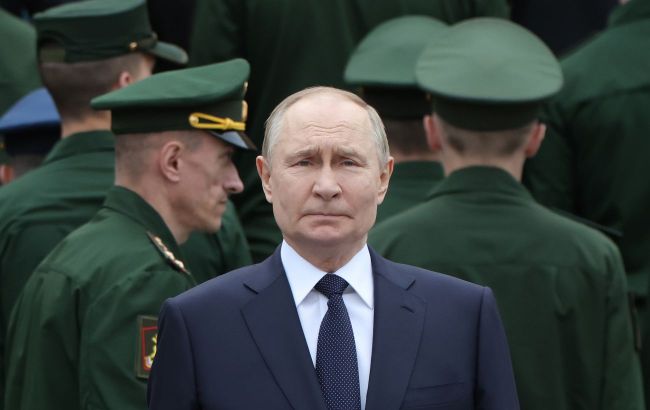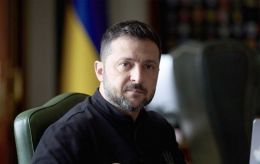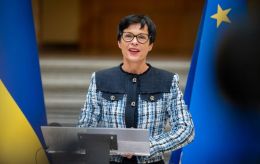Russia's only acceptable deal is Ukraine's capitulation — ISW
 Photo: Vladimir Putin (Getty Images)
Photo: Vladimir Putin (Getty Images)
Russia continues to reject any peace proposals, including the initial 28-point plan proposed by the United States, which does not meet Moscow's long-standing demands for the destruction of Ukrainian statehood and the weakening of NATO, according to the Institute for the Study of War (ISW).
Kremlin's position and statements by Sergei Ryabkov
On November 22, Russian Deputy Foreign Minister Sergei Ryabkov said that the Kremlin could not back down from the demands of Vladimir Putin, announced at the summit in Alaska in August 2025.
He also confirmed Russia's desire to allegedly eliminate the so-called root causes of the war. Ryabkov attributed these to NATO expansion, the deployment of weapons in Eastern Europe, and alleged discrimination against the Russian language, the Russian people, and the Russian Orthodox Church in Ukraine.
These statements are consistent with the positions of other senior Russian officials.
Ryabkov also stresses that Russia would continue to act in accordance with its national interests despite sanctions, indicating the Kremlin's willingness to maintain military action in Ukraine even under continued economic pressure.
According to ISW estimates, Putin also showed during the summit in Alaska that his views on Ukraine's sovereignty remain unchanged since 2021, and that Moscow is not interested in serious peace talks.
Criticism of US peace plan by Russian officials
In turn, Alexei Zhuravlev, deputy chairman of the Russian State Duma's Defense Committee, says that the US-proposed peace plan allegedly maintains a threat on the Russian border, referring to the existence of Ukraine and Russia's shared border with Poland and the Baltic states.
He argues that the plan should be treated with extreme caution and considered only as a starting point.
First Deputy Chairman of the State Duma Committee on International Affairs Alexei Chepa also criticizes the possibility of transferring long-range missiles, in particular Tomahawks, to Ukraine, stating that this contradicts Moscow's stated goal of demilitarization.
Russian media presents his statements as a warning as to why the West's peaceful proposals are allegedly unacceptable.
Reaction of allied regimes and propagandists
Vadim Gigin, a representative of the House of Representatives of the National Assembly of Belarus and a well-known propagandist, also joins in the criticism.
He states on Russian television that Russia cannot agree to the US plan due to mutual distrust between Moscow and Washington and the lack of an effective mechanism for implementing the agreement.
Position of ultra-nationalists and military bloggers
Ultranationalists and pro-war Russian microbloggers also continue to insist on rejecting any peace plan.
One blogger close to the Kremlin said that the plan could limit Russia's ability to seize more Ukrainian territory, and he interpreted Putin's statements on November 21 as a signal to continue the war while there is still an opportunity to advance.
Another blogger emphasizes that Russia's goals extend beyond Donbas and encompass all the territories that the Kremlin declared annexed in 2022, including the Zaporizhzhia and Kherson regions.
He also hints that Russia seeks to create a demilitarized zone all the way to the Polish border, demonstrating maximalist territorial claims.
According to ISW, Kremlin officials and pro-war bloggers have systematically rejected the 28-point US plan since it appeared in Western media on November 20.
Analysts believe that Russia is unlikely to accept any peace plan that does not involve Ukraine's actual surrender, while Ukraine and the West can instead use a number of Russia's weaknesses to put pressure on the Kremlin.
US peace plan for Ukraine
On November 20, Ukrainian President Volodymyr Zelenskyy was presented with a 28-point peace plan drafted under the guidance of US Special Representative Steve Witkoff in consultation with Russia.
Zelenskyy is expected to discuss the document with US President Donald Trump in the near future.
According to media reports, the plan provides for Ukraine to relinquish part of the unoccupied territories of the Donetsk region, reduce the Armed Forces of Ukraine, freeze the front line in Zaporizhzhia and Kherson region, lift sanctions against Russia, and introduce security guarantees similar to Article 5 of the NATO Treaty.
It also provides for the distribution of frozen Russian assets and the creation of a Peace Council.
On November 21, Zelenskyy warned that Ukraine is under intense pressure and may face a choice between dignity and partnership. He promised to offer alternatives and seek to ensure that Ukrainian interests are taken into account in the US plan.
Trump said he wanted the plan agreed upon by Thanksgiving. Reuters reported that the US threatened Ukraine with the suspension of intelligence and weapons supplies if it refused to support the document.
Vladimir Putin confirmed that he had also received a version of the plan, calling it modernized after Alaska.

